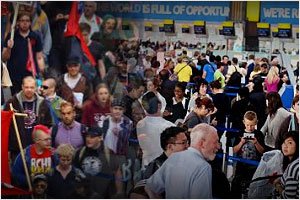More than two million public workers have staged a strike shutting down schools for the day and bringing public services in hospitals and councils to a virtual halt. In what is being called the worst disruption in public services within the past several decades, the nationwide strike has begun and the UK is just beginning to feel the effects.
The strike is joined by at least 30 unions who are protesting cuts to pensions in the public sector. Most state schools will be closed, rail service is halted, refuse will not be collected and most non-emergency operations at hospitals will be delayed. It is said that there will be dreadful delays at ferry terminals and airports.
This is being likened to the strike of 1979 when 1.5 million workers led a mass strike. In fact, strikers didn’t wait until the evening to start lining up as pickets were seen as early as dawn Tuesday. The reason behind the strikes is of course pension cuts, but also at issue is the fact that the state retirement age is being raised to 67 in 2026, a full eight years ahead of the earlier targeted date.
Adding fuel to the fire was the Chancellor’s announcement in his Autumn Statement that there would be a pay freeze in the public sector until year after next and pay rises would now be capped at just 1% for another two years following that.
One of the greater concerns is the fact that the UK Border Agency will have huge lines at major ports of entry and staff at passport desks will be operating at less than 50% staffing. Whilst government is working to minimize the amount of disruption the strike will cause, the day is not yet over.



